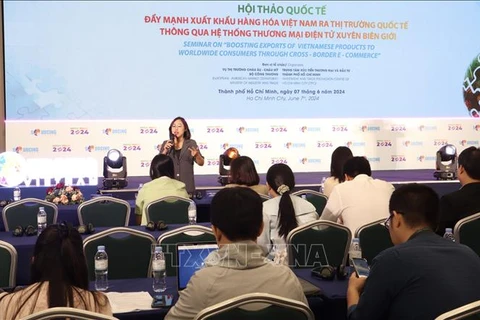
Hanoi (VNA) – The Government, ministries, sectors, localities, and the business community have concentrated on speeding up cross-border e-commerce development in the context that exports serve as a significant growth driver of the national economy.
Through policy support, guidance, and tools and solutions, Vietnamese businesses are expected to keep pace with digital transformation and achieve sustainable developments in the global market.
Statistics from Amazon Global Selling Vietnam (AGSV) indicate that cross-border e-commerce is growing 2.3 times higher than regular e-commerce in the 2022 – 2025 period. Amazon forecasts cross-border e-commerce in Vietnam and Southeast Asia to grow at 20% annually to 2026.
Vietnamese businesses have expanded their international business scope with the number of products exported and sold on Amazon increasing by 300% in the past five years. During this period, thousands of small- and medium-sized (SMEs)enterprises from Vietnam exported through Amazon, with many achieving annual revenues exceeding 1 million USD, a nearly tenfold increase.
According to the report “Local sellers, Global consumers 2022: Capturing the e-commerce export opportunity in Vietnam” of the UK’s Access Partnership, Vietnam is likely to witness a substantial surge in B2C e-commerce export revenues, reaching 296.3 trillion VND (13 billion USD) by 2027.
E-commerce plays an indispensable role in the export development strategy, enabling Vietnamese businesses to access international markets quickly and efficiently, enhancing competitiveness, and fostering sustainable development.
Bui Trung Kien, vice chairman of the Vietnam E-Commerce Association (VECOM), noted that the majority of Vietnam's export businesses are SMEs specialising in manufacturing, so many of them have not yet accessed cross-border e-commerce platforms.
Tran Thanh Hai, Deputy Director of the Import-Export Department under the Ministry of Industry and Trade (MoIT), emphasised the need to expand markets by not only traditional methods such as participating in fairs and exhibitions and fostering trade connections, but also through online platforms and digital ecosystems, and developing logistics to support import-export activities.
According to Hoang Ninh, Director of the MoIT’s E-Commerce and Digital Economy Agency, policies aimed at developing e-commerce in Vietnam have facilitated businesses, focusing on enhancing the legal framework, providing financial support, encouraging investment, developing digital infrastructure, protecting data and cybersecurity, and boosting the research and development of new technologies.
The ministry has intensified efforts to support SMEs, including providing free training courses, and helping businesses enhance product sale opportunities in both domestic and international markets through e-commerce platforms, he said.
VECOM has also implemented various activities to support businesses in navigating online exports in global markets, said its General Secretary Tran Van Trong.
According to Trinh Khac Toan, Director for the northern region of the AGSV, the firm has in collaboration with the MoIT trained 10,000 people for personnel for online export businesses over the last five years./.






















